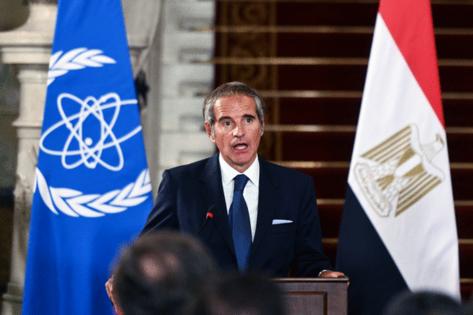Iran steps back from the brink with UN atomic watchdog deal
Published in News & Features
Iran took a step toward breaking the impasse with United Nations inspectors over access to its nuclear facilities, with a top-level meeting in Cairo yielding the groundwork for a return of monitors potentially as soon as next month, according to two diplomats familiar with the situation.
Whether the agreement between Iranian Foreign Minister Abbas Araghchi and the International Atomic Energy Agency is enough to forestall the re-imposition of punishing U.N. sanctions will be decided in the next two weeks, the diplomats said, asking not to be identified discussing restricted information.
“This technical document provides for a clear understanding of the procedures for inspection, notifications, and their implementation,” IAEA Director General Rafael Mariano Grossi said Wednesday in Vienna, after returning from the previous day’s meeting in Egypt. “It also contemplates the required reporting on all the attacked facilities, including the nuclear material present.”
The meeting in Egypt took place amid international efforts to revive oversight over Iran’s nuclear activities following the Israeli and U.S. airstrikes in June. While the attacks destroyed much of Iran’s surface-level atomic sites, they also ended two decades of inspections of Tehran’s enriched uranium stockpile.
That has meant the IAEA has lost track of the Islamic Republic’s inventory of near-bomb-grade uranium, which Iran may have moved to an undisclosed location.
IAEA hasn’t published details of its accord with Iran, which first needs to submit a report spelling out exactly where its uranium stockpiles are located, the diplomats said. After that, Tehran and the IAEA will continue negotiating over precisely how monitors can safely access bombed sites, some of which are strewn with unexploded ordnance and chemical contamination.
In a note circulated among diplomats on Wednesday, Iran reiterated its stance that inspectors will be able to resume verification of its uranium stockpile once “peace is reinstated and a fair, mutually accepted framework” is agreed upon. The document also stated that any deal will need to be authorized by parliament.
The Islamic Republic remains “fully committed” to the Treaty on the Non-Proliferation of Nuclear Weapons but “expects the agency not to yield to political pressures and to be impartial and technical,” Iran’s mission wrote to the IAEA.
The Persian Gulf nation has until Sept. 28 to convince France, Germany and the U.K. that it’s willing to resume IAEA cooperation. The countries last month triggered a mechanism to re-impose U.N. sanctions that were set to expire on Oct. 18.
IAEA officials convening at Wednesday’s board meeting in Vienna are expected to welcome the Iran agreement without immediately pausing the move to snap back penalties, according to the diplomats.
The Cairo encounter between Araghchi and Grossi took place as Israel conducted air attacks in Qatar against Hamas, a Palestinian militant group backed by Iran. The Islamic Republic has been reluctant to allow inspectors back into the country, citing concern that any information it provides to the IAEA could be used by Israel to target nuclear personnel or sites.
“The issue of confidentiality has been mentioned a lot,” Grossi said at a briefing on Monday. “We are ready to talk about their security concerns. And this is a part of what we are discussing now.”
©2025 Bloomberg L.P. Visit bloomberg.com. Distributed by Tribune Content Agency, LLC.







Comments